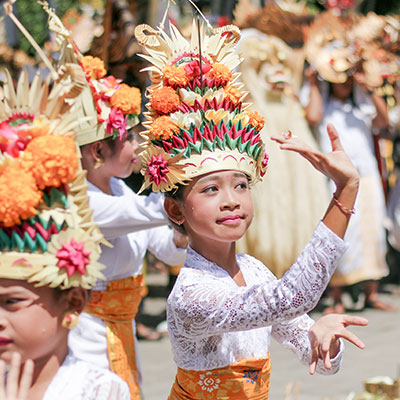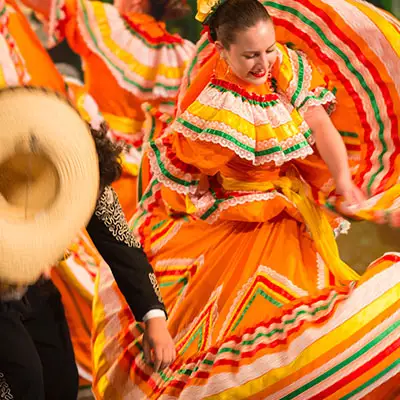You book a trip to Mexico for El Día de los Muertos, and you can’t wait to see the altars, taste the pan de muerto, and smell the ofrendas. You get to experience the celebration firsthand and have the immersive cultural experience you’ve been craving. But how do you celebrate in a responsible way?
As an “outsider,” it’s important to be culturally sensitive when participating in local celebrations, whether it’s the Day of the Dead, winter solstice, or an independence day. Here’s how you can get a rich and authentic experience while still honoring traditions respectfully.
How to Be a Culturally Sensitive Holiday Traveler
Educate yourself before you go.
This goes for any kind of travel — international or domestic, holiday or otherwise. Do some pre-departure homework to learn the customs and rules of wherever you’re going. Include in your research “unofficial” cultural rules as well as written laws and religious practices.
It's also a good idea to know what clothing is appropriate at your destination and if everyday clothing is different from what you’ll be expected to wear for holiday or cultural celebrations. For example, shorts might be acceptable to wear at a local market, while long pants for men and skirts for women are expected when visiting a temple in the same country.
Learn about food.
Many holidays have deep ties to food, and the food eaten during celebrations can be highly symbolic. Before you go, learn what traditional dishes you might be served and what their significance is. For example, you might be offered barmbrack for the Celtic festival of Samhain in Ireland. This quick bread with dried fruits is used for fortune-telling, so while Samhain has many traditions that look similar to an American Halloween, clearly, there are some key differences as well.
The foods you’re offered might not be to your taste, and that’s OK. Do your best to try them, and if you just can’t eat them, be polite when you decline another helping or are asked your opinion. Remember, bahn chung might just be a sticky rice cake to you, but to your Vietnamese host culture, it’s a tribute to their ancestors.
Beyond the food itself, brush up on table manners. Know which utensil to use for which dish, or even if you use utensils. You might be expected to use your hands, in which case, find out which hand you’re supposed to eat with. Are meals served family style? Is there an order to who is served?
Observe the rules of cultural and holy sites.
It’s no secret that many holidays are tied to religious tradition, so your travels might take you to holy sites. Hopefully you already learned a bit about this during your pre-departure homework, but remember that customs at these sites might be different or stricter than in other areas.
- Should you take your shoes off when visiting a holy site? Do you wash your feet or other parts of your body before entering?
- Do you need to cover your head? Your shoulders? Do you need to wear long pants?
- Is it appropriate to talk or is silence required?
- Can you touch statues or are they for contemplation only?
- Do you stand, sit, kneel, or walk around the room?
Know how to offer holiday greetings.

When traveling to a country that speaks a different language than your own, it’s always good to learn some key phrases. Not only does it make your own trip more enjoyable when you can communicate better, but your hosts will likely appreciate the effort you make.
When traveling for a holiday or cultural event, make sure you know how to make the appropriate holiday greetings. Need some examples? When wishing someone a happy Ramadan, you can usually say, “Ramadan Kareem.” On the last day of Ramadan, however, it’s best to use “Eid Mubarak” instead.
When offering greetings for Yom Kippur, avoid wishing someone a “happy” Yom Kippur. It’s not a “good tidings” kind of holiday and is instead considered a day of atonement. Instead, try “G’mar chatima tova,” which translates to “May you be sealed in the Book of Life.”
Use a local guide or host family.
A good rule of thumb is that when in doubt, ask someone. And there’s no one better to ask than someone ingrained in your host culture and who grew up celebrating that tradition. Local guides or a host family can help you avoid cultural faux pas, uncover the more subtle nuances of a holiday, and maybe even get you behind the scenes to experiences you wouldn’t have found on your own.
Ask permission to take photos.

It's incredibly tempting to take tons of pictures at holiday festivities, especially when they’re bright and glittery and colorful. However, doing so can be intrusive at best and illegal at worst. Taking pictures — at all or during certain moments of a celebratory rite — can be extremely offensive and might even ruin the ceremony’s effectiveness. Some sites, like Uluru or Ayer’s Rock in Australia, which is considered sacred by Aboriginal people, prohibit photography as well. (It’s why you only ever see pictures of it from afar.)
A good rule of thumb is to ask permission before you take pictures. If there’s no one to ask — perhaps because of a language barrier — take cues from those around you. Notice if locals are taking pictures and follow their lead. If you’re unsure, just keep your camera in your bag. And if taking photos feels intrusive or wrong, it probably is.
Embrace that your holidays aren’t celebrated the same way.
Another way to put this is to be aware of your own culture as much as you are of theirs. You might both celebrate Christmas, for example, but Christmas traditions can vary widely around the world. Fight the urge to pass judgement on your host culture’s traditions or compare them to your own. Instead, embrace the new experience you’ve been gifted.
How to Protect Your Holiday Trip
Holiday travel can get expensive, either because of pricey flights during peak times or because you’ve purchased a special excursion to get you to the heart of the festivities. Protect your investment so you can immerse yourself in the experience without worrying about the money you spent for your trip. Talk to our licensed travel insurance agents to get the best travel insurance for your next trip.

